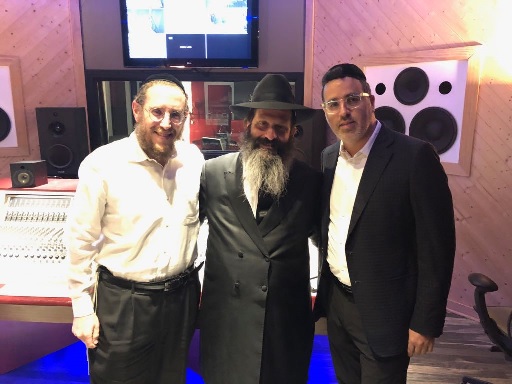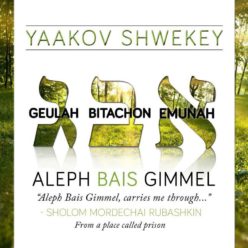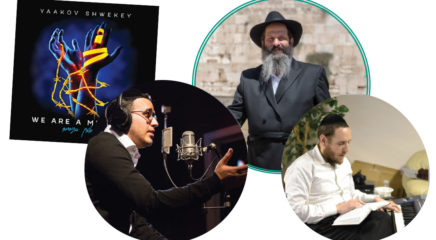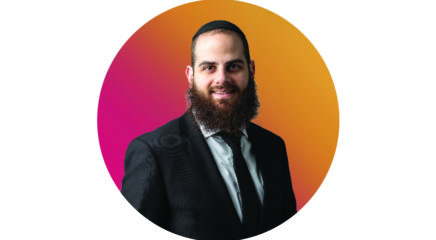“A place called prison,” as Reb Sholom Mordechai Rubashkin referred to Otisville Federal Correctional Institution, is an unusual setting for uplifting music. It was some years ago that Yaakov Shwekey first went to visit, in the early days of Reb Sholom Mordechai’s eight-year incarceration. Overcome by emotions at seeing Reb Sholom Mordechai behind bars, Yaakov called Yitzy Waldner on the way home.
“We just have to make a song dedicated to him,” Yaakov told his composer friend. The words he chose were “Keili Keili lamah azavtani — my G-d, why have you forsaken me?” (Tehillim 22: 2). Yitzy sat down and composed a tune, but when they discussed their plans with Rabbi Pinchos Lipschutz, editor at Yated Neeman and one of Rubashkin’s close friends and supporters, he vetoed the idea.
“There is no way you can attach those words to Reb Sholom Mordechai,” he said. “He doesn’t feel abandoned by the Ribbono Shel Olam at all — he feels Hashem’s presence right there with him!”
“Lamah Azavtani” got shelved, and soon Shwekey and Waldner wrote another song dedicated to Rubashkin: the upbeat “Maamin Benissim,” an Israeli-style dance song with lyrics that translate: “I believe in miracles, I know there is a G-d and he is the Creator of the world, He hears my voice and will send my miracle. Despair is forbidden… continue to ask and keep up hope.”
“This time,” says Waldner, “we felt the message was more Reb Sholom Mordechai’s style.”
In 2017, Yaakov Shwekey returned to Otisville, this time to perform for the Jewish inmates, together with Yitzy Waldner and some friends. They set up their instruments in the prison chapel and waited for the arrival of the melancholy prisoners whom they’d come to be mechazeik. And in came a group led by “the most alive person you could imagine. He looked like a man going to his own child’s wedding,” says Waldner. “We played and sang, and Reb Sholom Mordechai sang, danced, jumped — and even did somersaults. The simchah he spread in the room was incredible. And he loved ‘Maamin Benissim.’ ”
And as he did each day of his incarceration, Reb Sholom Mordechai shared his message of “Emunah un Bitachon brengt di Geulah,” and his pithy acronym for the concept, “Alef, Beis, Gimmel.”
Yaakov Shwekey made a commitment to him that day. “When you come out of here, we’ll make a party and seudas hoda’ah in your house, and we’ll dance there.”
Not long afterward, Mrs. Leah Rubashkin reached out to Shwekey to thank him for the song. Her son Moshe, she said, fell asleep to it every night. It seemed to give him hope that his father would come home.
It was impossible for the musicians to forget Reb Sholom Mordechai’s joy and faith. And less than a year later, with the Zos Chanukah miracle of his release, he made a phone call to Yaakov Shwekey. The singer and musicians were ready for the promised party, but Reb Sholom Mordechai himself had a packed schedule that took him from coast to coast, meeting and celebrating his release with the tens of thousands of his brothers who had joined in his pain and prayed for this day.
It took a few months for the promised event to happen. The group who had met in the prison chapel met again in the Rubashkin home. Yitzy Waldner had a family wedding but Shwekey got him on the phone so Rubashkin could thank the composer again for “Maamin Benissim.” And he also made a request: “Now, you have to make a song for Alef Beis Gimmel — Emunah un bitachon brengt di geulah.”
And he did. The song that Yitzy wrote is a springy, effervescent number, the mantra “Alef Beis Gimmel brengt, brengt di geulah” repeatedly rippling through it. Listeners hear the sincere “Alef Beis Gimmel” cry of Reb Sholom Mordechai Rubashkin himself, recorded in studio now but on his lips for the past decade. It’s a refrain that listeners, who have been his talmidim in a great life’s lesson of emunah and bitachon, will be happy to repeat along with him. (Originally featured in Mishpacha, Issue 713)





